Business Law: Company vs. Franchise, James's Business Decision
VerifiedAdded on 2023/06/04
|7
|2602
|203
Essay
AI Summary
This essay evaluates the optimal business structure for James, considering the options of forming a company or acquiring a franchise. It explores the essential features of a company, including its separate legal entity and limited liability, while also addressing associated risks like the piercing of the corporate veil. The essay then examines the characteristics of a franchisee, such as the right to use the franchisor's mark and the governance by agreement, alongside the benefits and risks of franchising. The analysis includes relevant case law and statutory provisions, such as the Companies Act 1993 and the Contractual Remedies Act 1979, providing a comprehensive comparison to guide James in making an informed decision. The essay also highlights key considerations for franchise buyers, emphasizing the importance of understanding contractual obligations and potential misrepresentations.
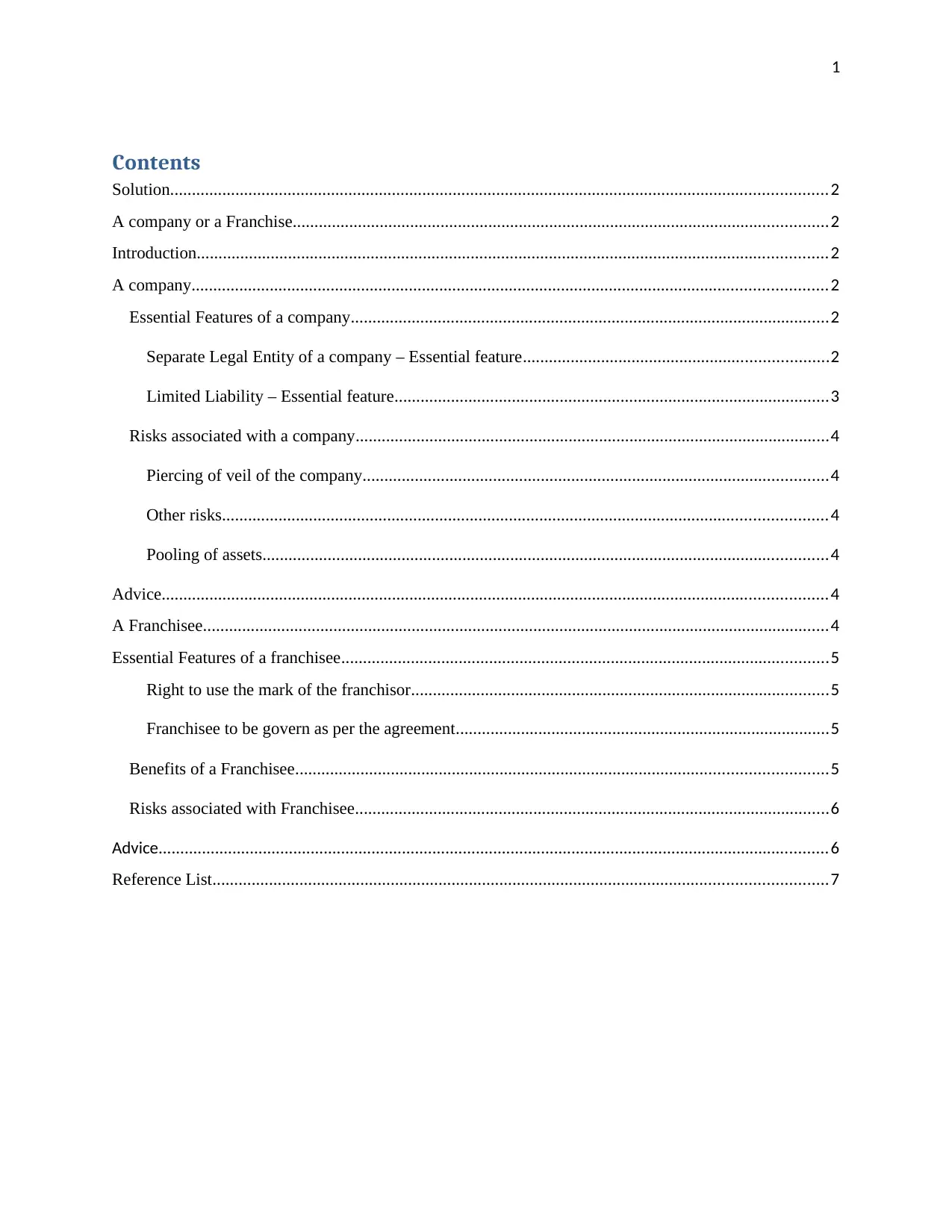
1
Contents
Solution.......................................................................................................................................................2
A company or a Franchise...........................................................................................................................2
Introduction.................................................................................................................................................2
A company..................................................................................................................................................2
Essential Features of a company..............................................................................................................2
Separate Legal Entity of a company – Essential feature......................................................................2
Limited Liability – Essential feature....................................................................................................3
Risks associated with a company.............................................................................................................4
Piercing of veil of the company...........................................................................................................4
Other risks...........................................................................................................................................4
Pooling of assets..................................................................................................................................4
Advice.........................................................................................................................................................4
A Franchisee................................................................................................................................................4
Essential Features of a franchisee................................................................................................................5
Right to use the mark of the franchisor................................................................................................5
Franchisee to be govern as per the agreement......................................................................................5
Benefits of a Franchisee..........................................................................................................................5
Risks associated with Franchisee.............................................................................................................6
Advice..........................................................................................................................................................6
Reference List.............................................................................................................................................7
Contents
Solution.......................................................................................................................................................2
A company or a Franchise...........................................................................................................................2
Introduction.................................................................................................................................................2
A company..................................................................................................................................................2
Essential Features of a company..............................................................................................................2
Separate Legal Entity of a company – Essential feature......................................................................2
Limited Liability – Essential feature....................................................................................................3
Risks associated with a company.............................................................................................................4
Piercing of veil of the company...........................................................................................................4
Other risks...........................................................................................................................................4
Pooling of assets..................................................................................................................................4
Advice.........................................................................................................................................................4
A Franchisee................................................................................................................................................4
Essential Features of a franchisee................................................................................................................5
Right to use the mark of the franchisor................................................................................................5
Franchisee to be govern as per the agreement......................................................................................5
Benefits of a Franchisee..........................................................................................................................5
Risks associated with Franchisee.............................................................................................................6
Advice..........................................................................................................................................................6
Reference List.............................................................................................................................................7
Paraphrase This Document
Need a fresh take? Get an instant paraphrase of this document with our AI Paraphraser
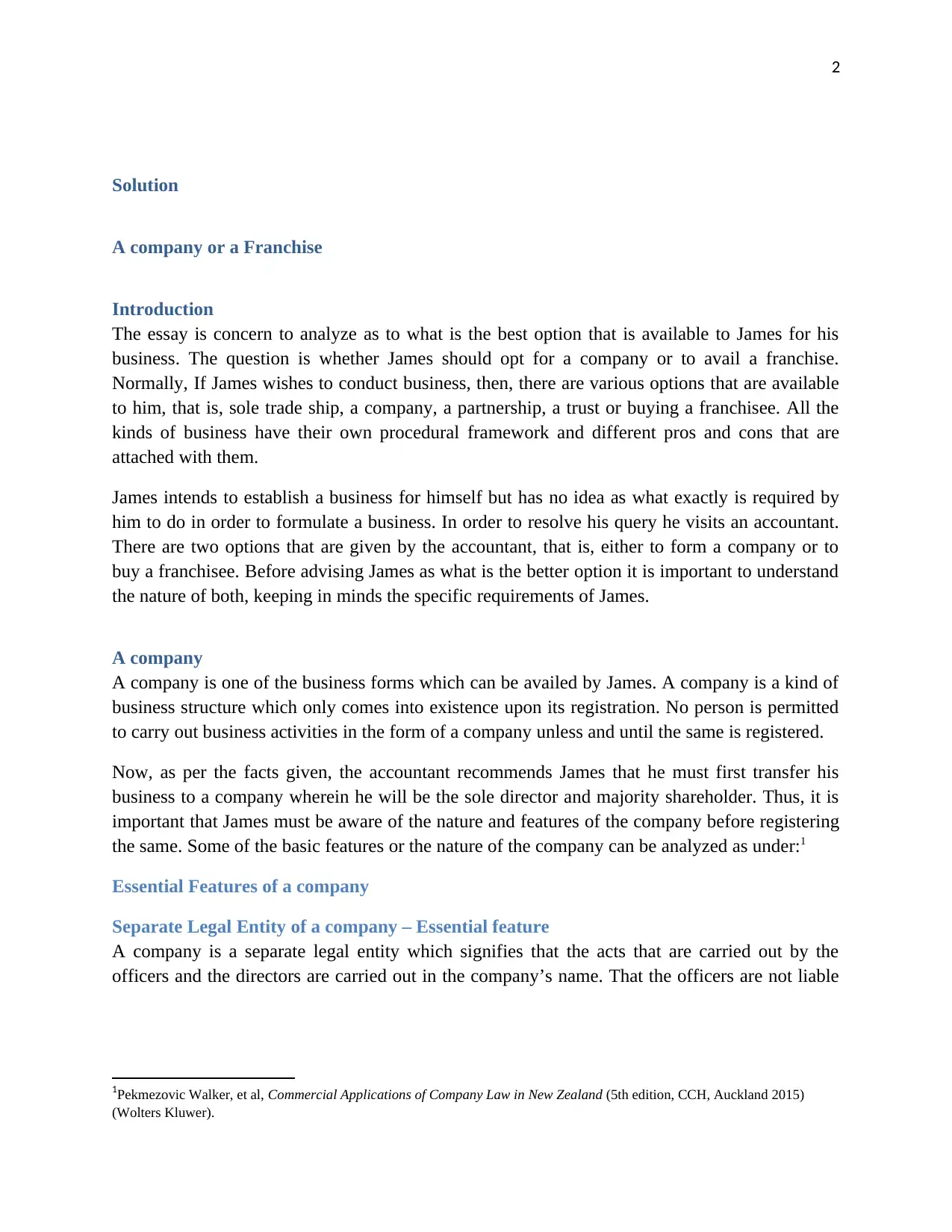
2
Solution
A company or a Franchise
Introduction
The essay is concern to analyze as to what is the best option that is available to James for his
business. The question is whether James should opt for a company or to avail a franchise.
Normally, If James wishes to conduct business, then, there are various options that are available
to him, that is, sole trade ship, a company, a partnership, a trust or buying a franchisee. All the
kinds of business have their own procedural framework and different pros and cons that are
attached with them.
James intends to establish a business for himself but has no idea as what exactly is required by
him to do in order to formulate a business. In order to resolve his query he visits an accountant.
There are two options that are given by the accountant, that is, either to form a company or to
buy a franchisee. Before advising James as what is the better option it is important to understand
the nature of both, keeping in minds the specific requirements of James.
A company
A company is one of the business forms which can be availed by James. A company is a kind of
business structure which only comes into existence upon its registration. No person is permitted
to carry out business activities in the form of a company unless and until the same is registered.
Now, as per the facts given, the accountant recommends James that he must first transfer his
business to a company wherein he will be the sole director and majority shareholder. Thus, it is
important that James must be aware of the nature and features of the company before registering
the same. Some of the basic features or the nature of the company can be analyzed as under:1
Essential Features of a company
Separate Legal Entity of a company – Essential feature
A company is a separate legal entity which signifies that the acts that are carried out by the
officers and the directors are carried out in the company’s name. That the officers are not liable
1Pekmezovic Walker, et al, Commercial Applications of Company Law in New Zealand (5th edition, CCH, Auckland 2015)
(Wolters Kluwer).
Solution
A company or a Franchise
Introduction
The essay is concern to analyze as to what is the best option that is available to James for his
business. The question is whether James should opt for a company or to avail a franchise.
Normally, If James wishes to conduct business, then, there are various options that are available
to him, that is, sole trade ship, a company, a partnership, a trust or buying a franchisee. All the
kinds of business have their own procedural framework and different pros and cons that are
attached with them.
James intends to establish a business for himself but has no idea as what exactly is required by
him to do in order to formulate a business. In order to resolve his query he visits an accountant.
There are two options that are given by the accountant, that is, either to form a company or to
buy a franchisee. Before advising James as what is the better option it is important to understand
the nature of both, keeping in minds the specific requirements of James.
A company
A company is one of the business forms which can be availed by James. A company is a kind of
business structure which only comes into existence upon its registration. No person is permitted
to carry out business activities in the form of a company unless and until the same is registered.
Now, as per the facts given, the accountant recommends James that he must first transfer his
business to a company wherein he will be the sole director and majority shareholder. Thus, it is
important that James must be aware of the nature and features of the company before registering
the same. Some of the basic features or the nature of the company can be analyzed as under:1
Essential Features of a company
Separate Legal Entity of a company – Essential feature
A company is a separate legal entity which signifies that the acts that are carried out by the
officers and the directors are carried out in the company’s name. That the officers are not liable
1Pekmezovic Walker, et al, Commercial Applications of Company Law in New Zealand (5th edition, CCH, Auckland 2015)
(Wolters Kluwer).
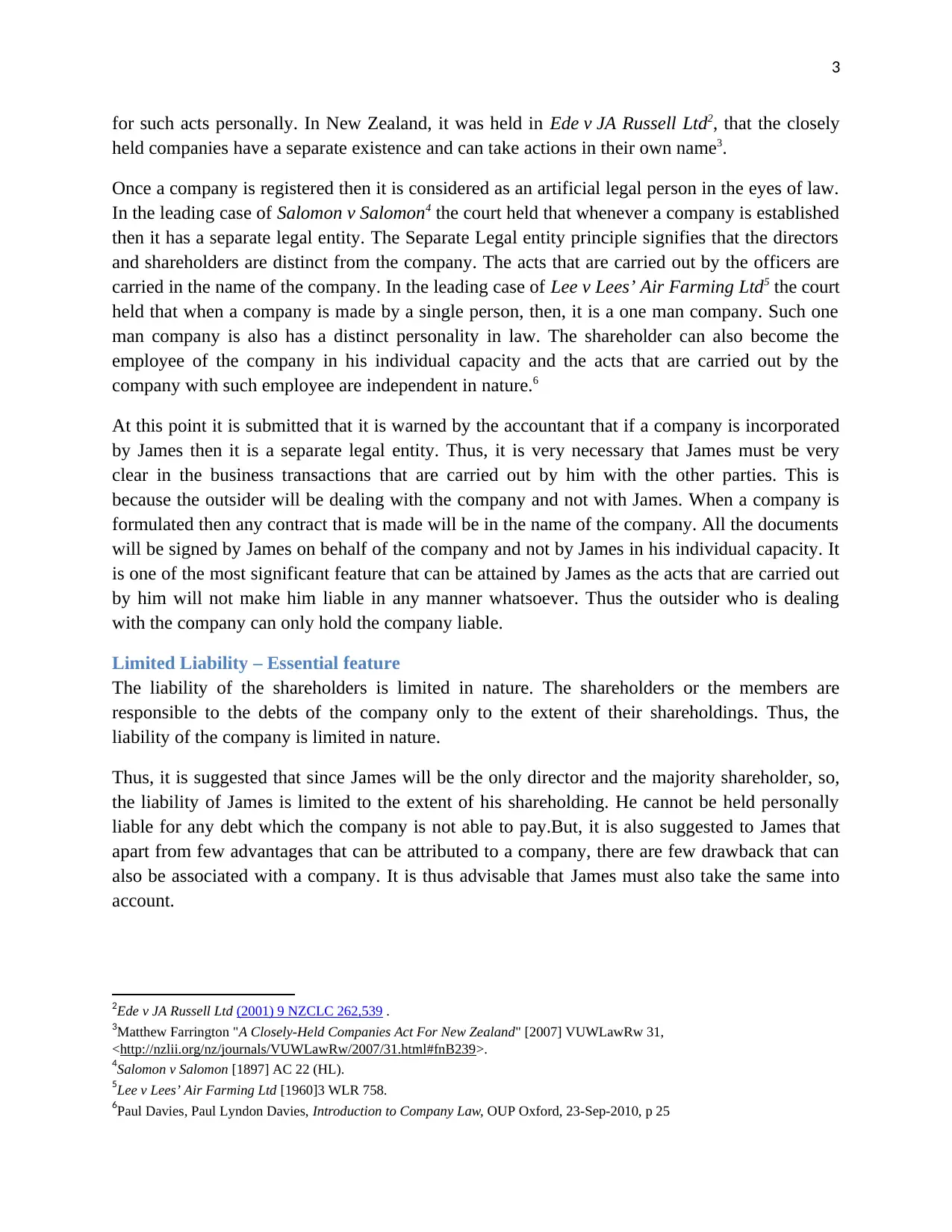
3
for such acts personally. In New Zealand, it was held in Ede v JA Russell Ltd2, that the closely
held companies have a separate existence and can take actions in their own name3.
Once a company is registered then it is considered as an artificial legal person in the eyes of law.
In the leading case of Salomon v Salomon4 the court held that whenever a company is established
then it has a separate legal entity. The Separate Legal entity principle signifies that the directors
and shareholders are distinct from the company. The acts that are carried out by the officers are
carried in the name of the company. In the leading case of Lee v Lees’ Air Farming Ltd5 the court
held that when a company is made by a single person, then, it is a one man company. Such one
man company is also has a distinct personality in law. The shareholder can also become the
employee of the company in his individual capacity and the acts that are carried out by the
company with such employee are independent in nature.6
At this point it is submitted that it is warned by the accountant that if a company is incorporated
by James then it is a separate legal entity. Thus, it is very necessary that James must be very
clear in the business transactions that are carried out by him with the other parties. This is
because the outsider will be dealing with the company and not with James. When a company is
formulated then any contract that is made will be in the name of the company. All the documents
will be signed by James on behalf of the company and not by James in his individual capacity. It
is one of the most significant feature that can be attained by James as the acts that are carried out
by him will not make him liable in any manner whatsoever. Thus the outsider who is dealing
with the company can only hold the company liable.
Limited Liability – Essential feature
The liability of the shareholders is limited in nature. The shareholders or the members are
responsible to the debts of the company only to the extent of their shareholdings. Thus, the
liability of the company is limited in nature.
Thus, it is suggested that since James will be the only director and the majority shareholder, so,
the liability of James is limited to the extent of his shareholding. He cannot be held personally
liable for any debt which the company is not able to pay.But, it is also suggested to James that
apart from few advantages that can be attributed to a company, there are few drawback that can
also be associated with a company. It is thus advisable that James must also take the same into
account.
2Ede v JA Russell Ltd (2001) 9 NZCLC 262,539 .
3Matthew Farrington "A Closely-Held Companies Act For New Zealand" [2007] VUWLawRw 31,
<http://nzlii.org/nz/journals/VUWLawRw/2007/31.html#fnB239>.
4Salomon v Salomon [1897] AC 22 (HL).
5Lee v Lees’ Air Farming Ltd [1960]3 WLR 758.
6Paul Davies, Paul Lyndon Davies, Introduction to Company Law, OUP Oxford, 23-Sep-2010, p 25
for such acts personally. In New Zealand, it was held in Ede v JA Russell Ltd2, that the closely
held companies have a separate existence and can take actions in their own name3.
Once a company is registered then it is considered as an artificial legal person in the eyes of law.
In the leading case of Salomon v Salomon4 the court held that whenever a company is established
then it has a separate legal entity. The Separate Legal entity principle signifies that the directors
and shareholders are distinct from the company. The acts that are carried out by the officers are
carried in the name of the company. In the leading case of Lee v Lees’ Air Farming Ltd5 the court
held that when a company is made by a single person, then, it is a one man company. Such one
man company is also has a distinct personality in law. The shareholder can also become the
employee of the company in his individual capacity and the acts that are carried out by the
company with such employee are independent in nature.6
At this point it is submitted that it is warned by the accountant that if a company is incorporated
by James then it is a separate legal entity. Thus, it is very necessary that James must be very
clear in the business transactions that are carried out by him with the other parties. This is
because the outsider will be dealing with the company and not with James. When a company is
formulated then any contract that is made will be in the name of the company. All the documents
will be signed by James on behalf of the company and not by James in his individual capacity. It
is one of the most significant feature that can be attained by James as the acts that are carried out
by him will not make him liable in any manner whatsoever. Thus the outsider who is dealing
with the company can only hold the company liable.
Limited Liability – Essential feature
The liability of the shareholders is limited in nature. The shareholders or the members are
responsible to the debts of the company only to the extent of their shareholdings. Thus, the
liability of the company is limited in nature.
Thus, it is suggested that since James will be the only director and the majority shareholder, so,
the liability of James is limited to the extent of his shareholding. He cannot be held personally
liable for any debt which the company is not able to pay.But, it is also suggested to James that
apart from few advantages that can be attributed to a company, there are few drawback that can
also be associated with a company. It is thus advisable that James must also take the same into
account.
2Ede v JA Russell Ltd (2001) 9 NZCLC 262,539 .
3Matthew Farrington "A Closely-Held Companies Act For New Zealand" [2007] VUWLawRw 31,
<http://nzlii.org/nz/journals/VUWLawRw/2007/31.html#fnB239>.
4Salomon v Salomon [1897] AC 22 (HL).
5Lee v Lees’ Air Farming Ltd [1960]3 WLR 758.
6Paul Davies, Paul Lyndon Davies, Introduction to Company Law, OUP Oxford, 23-Sep-2010, p 25
⊘ This is a preview!⊘
Do you want full access?
Subscribe today to unlock all pages.

Trusted by 1+ million students worldwide
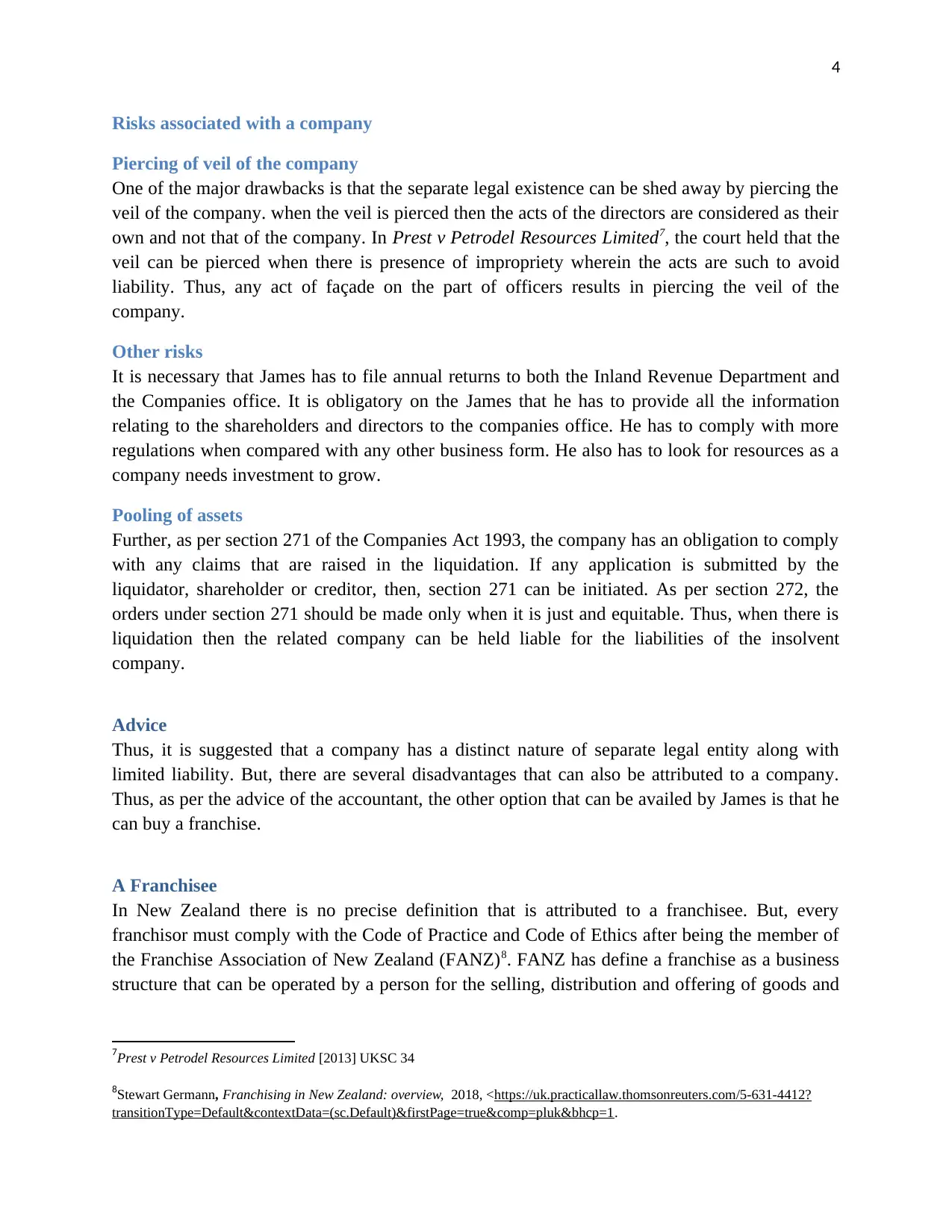
4
Risks associated with a company
Piercing of veil of the company
One of the major drawbacks is that the separate legal existence can be shed away by piercing the
veil of the company. when the veil is pierced then the acts of the directors are considered as their
own and not that of the company. In Prest v Petrodel Resources Limited7, the court held that the
veil can be pierced when there is presence of impropriety wherein the acts are such to avoid
liability. Thus, any act of façade on the part of officers results in piercing the veil of the
company.
Other risks
It is necessary that James has to file annual returns to both the Inland Revenue Department and
the Companies office. It is obligatory on the James that he has to provide all the information
relating to the shareholders and directors to the companies office. He has to comply with more
regulations when compared with any other business form. He also has to look for resources as a
company needs investment to grow.
Pooling of assets
Further, as per section 271 of the Companies Act 1993, the company has an obligation to comply
with any claims that are raised in the liquidation. If any application is submitted by the
liquidator, shareholder or creditor, then, section 271 can be initiated. As per section 272, the
orders under section 271 should be made only when it is just and equitable. Thus, when there is
liquidation then the related company can be held liable for the liabilities of the insolvent
company.
Advice
Thus, it is suggested that a company has a distinct nature of separate legal entity along with
limited liability. But, there are several disadvantages that can also be attributed to a company.
Thus, as per the advice of the accountant, the other option that can be availed by James is that he
can buy a franchise.
A Franchisee
In New Zealand there is no precise definition that is attributed to a franchisee. But, every
franchisor must comply with the Code of Practice and Code of Ethics after being the member of
the Franchise Association of New Zealand (FANZ)8. FANZ has define a franchise as a business
structure that can be operated by a person for the selling, distribution and offering of goods and
7Prest v Petrodel Resources Limited [2013] UKSC 34
8Stewart Germann, Franchising in New Zealand: overview, 2018, <https://uk.practicallaw.thomsonreuters.com/5-631-4412?
transitionType=Default&contextData=(sc.Default)&firstPage=true&comp=pluk&bhcp=1.
Risks associated with a company
Piercing of veil of the company
One of the major drawbacks is that the separate legal existence can be shed away by piercing the
veil of the company. when the veil is pierced then the acts of the directors are considered as their
own and not that of the company. In Prest v Petrodel Resources Limited7, the court held that the
veil can be pierced when there is presence of impropriety wherein the acts are such to avoid
liability. Thus, any act of façade on the part of officers results in piercing the veil of the
company.
Other risks
It is necessary that James has to file annual returns to both the Inland Revenue Department and
the Companies office. It is obligatory on the James that he has to provide all the information
relating to the shareholders and directors to the companies office. He has to comply with more
regulations when compared with any other business form. He also has to look for resources as a
company needs investment to grow.
Pooling of assets
Further, as per section 271 of the Companies Act 1993, the company has an obligation to comply
with any claims that are raised in the liquidation. If any application is submitted by the
liquidator, shareholder or creditor, then, section 271 can be initiated. As per section 272, the
orders under section 271 should be made only when it is just and equitable. Thus, when there is
liquidation then the related company can be held liable for the liabilities of the insolvent
company.
Advice
Thus, it is suggested that a company has a distinct nature of separate legal entity along with
limited liability. But, there are several disadvantages that can also be attributed to a company.
Thus, as per the advice of the accountant, the other option that can be availed by James is that he
can buy a franchise.
A Franchisee
In New Zealand there is no precise definition that is attributed to a franchisee. But, every
franchisor must comply with the Code of Practice and Code of Ethics after being the member of
the Franchise Association of New Zealand (FANZ)8. FANZ has define a franchise as a business
structure that can be operated by a person for the selling, distribution and offering of goods and
7Prest v Petrodel Resources Limited [2013] UKSC 34
8Stewart Germann, Franchising in New Zealand: overview, 2018, <https://uk.practicallaw.thomsonreuters.com/5-631-4412?
transitionType=Default&contextData=(sc.Default)&firstPage=true&comp=pluk&bhcp=1.
Paraphrase This Document
Need a fresh take? Get an instant paraphrase of this document with our AI Paraphraser
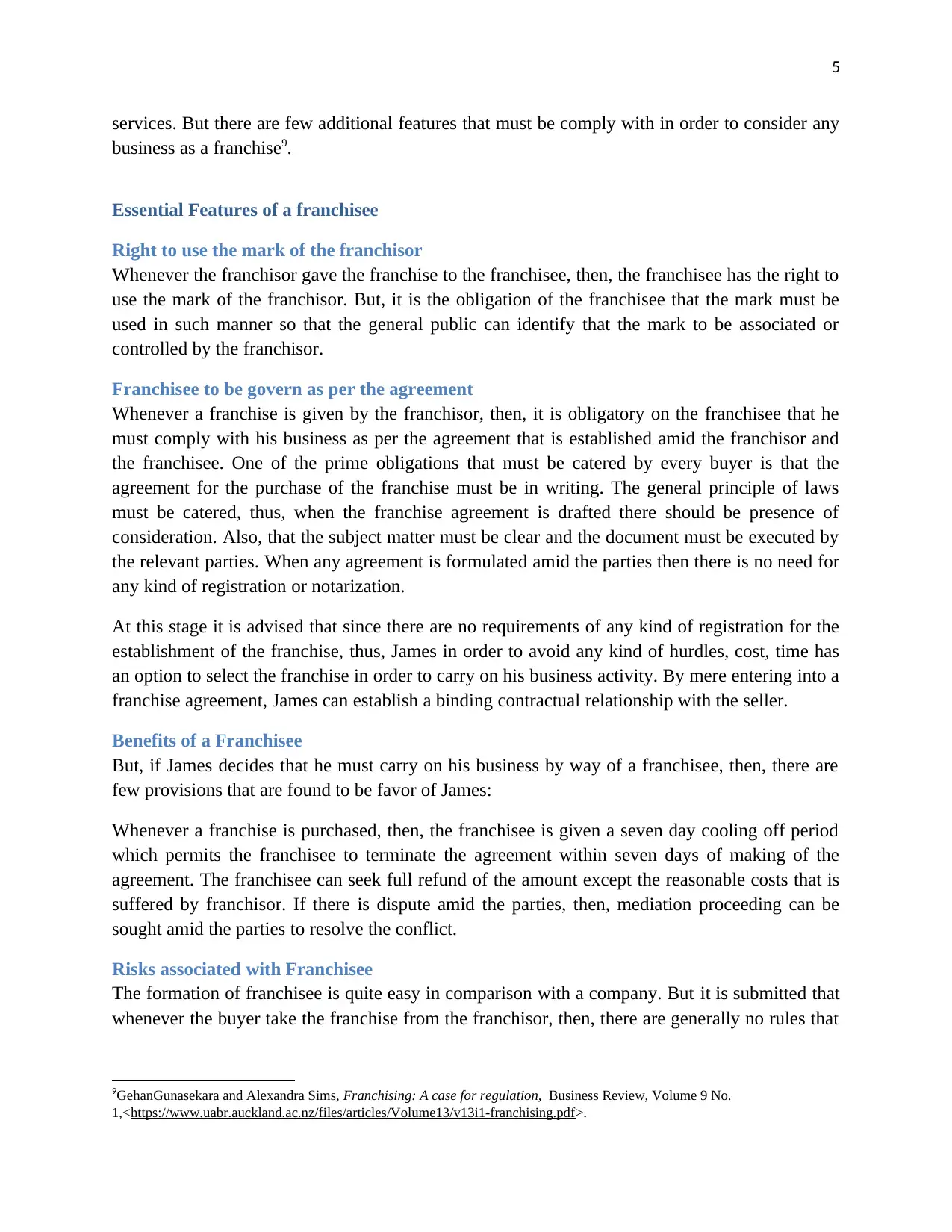
5
services. But there are few additional features that must be comply with in order to consider any
business as a franchise9.
Essential Features of a franchisee
Right to use the mark of the franchisor
Whenever the franchisor gave the franchise to the franchisee, then, the franchisee has the right to
use the mark of the franchisor. But, it is the obligation of the franchisee that the mark must be
used in such manner so that the general public can identify that the mark to be associated or
controlled by the franchisor.
Franchisee to be govern as per the agreement
Whenever a franchise is given by the franchisor, then, it is obligatory on the franchisee that he
must comply with his business as per the agreement that is established amid the franchisor and
the franchisee. One of the prime obligations that must be catered by every buyer is that the
agreement for the purchase of the franchise must be in writing. The general principle of laws
must be catered, thus, when the franchise agreement is drafted there should be presence of
consideration. Also, that the subject matter must be clear and the document must be executed by
the relevant parties. When any agreement is formulated amid the parties then there is no need for
any kind of registration or notarization.
At this stage it is advised that since there are no requirements of any kind of registration for the
establishment of the franchise, thus, James in order to avoid any kind of hurdles, cost, time has
an option to select the franchise in order to carry on his business activity. By mere entering into a
franchise agreement, James can establish a binding contractual relationship with the seller.
Benefits of a Franchisee
But, if James decides that he must carry on his business by way of a franchisee, then, there are
few provisions that are found to be favor of James:
Whenever a franchise is purchased, then, the franchisee is given a seven day cooling off period
which permits the franchisee to terminate the agreement within seven days of making of the
agreement. The franchisee can seek full refund of the amount except the reasonable costs that is
suffered by franchisor. If there is dispute amid the parties, then, mediation proceeding can be
sought amid the parties to resolve the conflict.
Risks associated with Franchisee
The formation of franchisee is quite easy in comparison with a company. But it is submitted that
whenever the buyer take the franchise from the franchisor, then, there are generally no rules that
9GehanGunasekara and Alexandra Sims, Franchising: A case for regulation, Business Review, Volume 9 No.
1,<https://www.uabr.auckland.ac.nz/files/articles/Volume13/v13i1-franchising.pdf>.
services. But there are few additional features that must be comply with in order to consider any
business as a franchise9.
Essential Features of a franchisee
Right to use the mark of the franchisor
Whenever the franchisor gave the franchise to the franchisee, then, the franchisee has the right to
use the mark of the franchisor. But, it is the obligation of the franchisee that the mark must be
used in such manner so that the general public can identify that the mark to be associated or
controlled by the franchisor.
Franchisee to be govern as per the agreement
Whenever a franchise is given by the franchisor, then, it is obligatory on the franchisee that he
must comply with his business as per the agreement that is established amid the franchisor and
the franchisee. One of the prime obligations that must be catered by every buyer is that the
agreement for the purchase of the franchise must be in writing. The general principle of laws
must be catered, thus, when the franchise agreement is drafted there should be presence of
consideration. Also, that the subject matter must be clear and the document must be executed by
the relevant parties. When any agreement is formulated amid the parties then there is no need for
any kind of registration or notarization.
At this stage it is advised that since there are no requirements of any kind of registration for the
establishment of the franchise, thus, James in order to avoid any kind of hurdles, cost, time has
an option to select the franchise in order to carry on his business activity. By mere entering into a
franchise agreement, James can establish a binding contractual relationship with the seller.
Benefits of a Franchisee
But, if James decides that he must carry on his business by way of a franchisee, then, there are
few provisions that are found to be favor of James:
Whenever a franchise is purchased, then, the franchisee is given a seven day cooling off period
which permits the franchisee to terminate the agreement within seven days of making of the
agreement. The franchisee can seek full refund of the amount except the reasonable costs that is
suffered by franchisor. If there is dispute amid the parties, then, mediation proceeding can be
sought amid the parties to resolve the conflict.
Risks associated with Franchisee
The formation of franchisee is quite easy in comparison with a company. But it is submitted that
whenever the buyer take the franchise from the franchisor, then, there are generally no rules that
9GehanGunasekara and Alexandra Sims, Franchising: A case for regulation, Business Review, Volume 9 No.
1,<https://www.uabr.auckland.ac.nz/files/articles/Volume13/v13i1-franchising.pdf>.
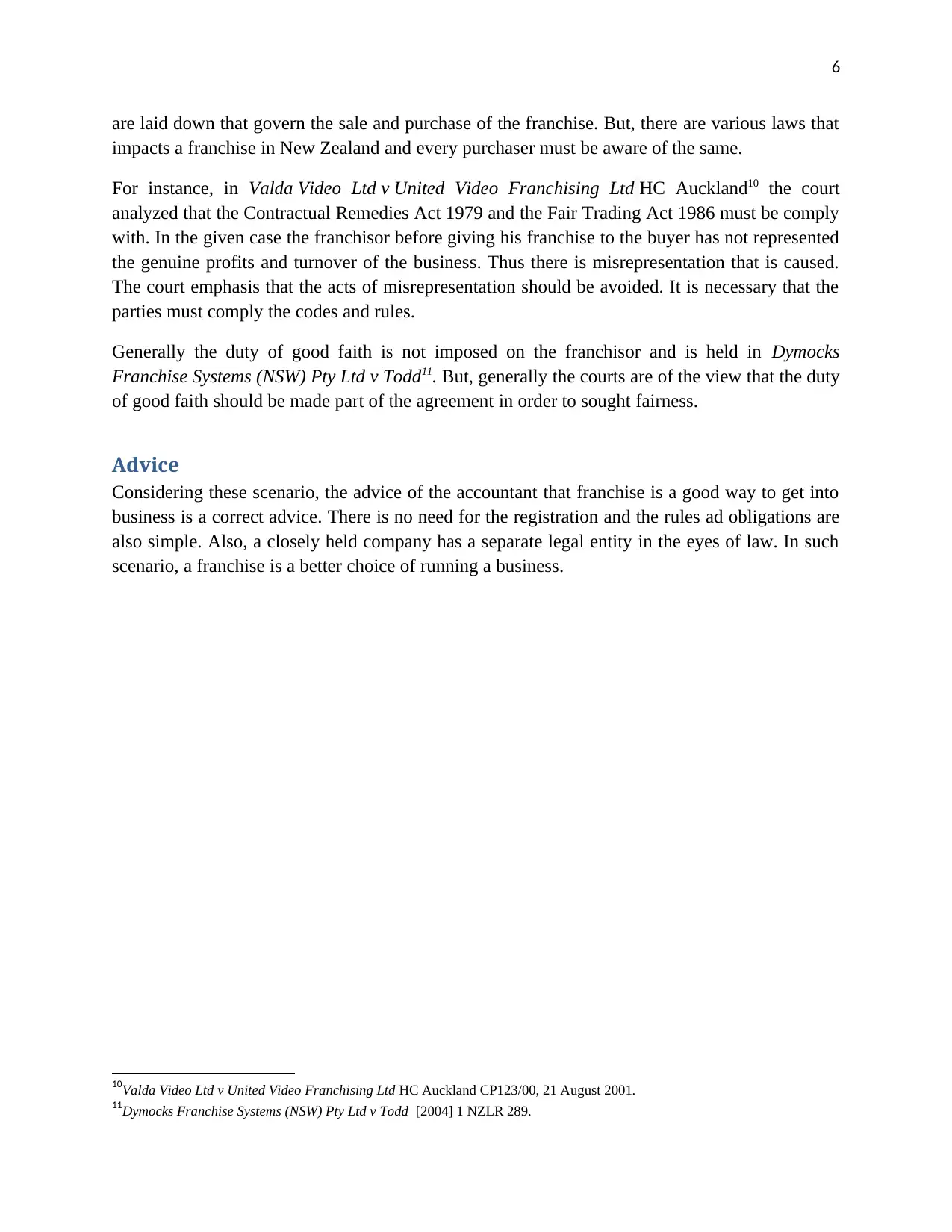
6
are laid down that govern the sale and purchase of the franchise. But, there are various laws that
impacts a franchise in New Zealand and every purchaser must be aware of the same.
For instance, in Valda Video Ltd v United Video Franchising Ltd HC Auckland10 the court
analyzed that the Contractual Remedies Act 1979 and the Fair Trading Act 1986 must be comply
with. In the given case the franchisor before giving his franchise to the buyer has not represented
the genuine profits and turnover of the business. Thus there is misrepresentation that is caused.
The court emphasis that the acts of misrepresentation should be avoided. It is necessary that the
parties must comply the codes and rules.
Generally the duty of good faith is not imposed on the franchisor and is held in Dymocks
Franchise Systems (NSW) Pty Ltd v Todd11. But, generally the courts are of the view that the duty
of good faith should be made part of the agreement in order to sought fairness.
Advice
Considering these scenario, the advice of the accountant that franchise is a good way to get into
business is a correct advice. There is no need for the registration and the rules ad obligations are
also simple. Also, a closely held company has a separate legal entity in the eyes of law. In such
scenario, a franchise is a better choice of running a business.
10Valda Video Ltd v United Video Franchising Ltd HC Auckland CP123/00, 21 August 2001.
11Dymocks Franchise Systems (NSW) Pty Ltd v Todd [2004] 1 NZLR 289.
are laid down that govern the sale and purchase of the franchise. But, there are various laws that
impacts a franchise in New Zealand and every purchaser must be aware of the same.
For instance, in Valda Video Ltd v United Video Franchising Ltd HC Auckland10 the court
analyzed that the Contractual Remedies Act 1979 and the Fair Trading Act 1986 must be comply
with. In the given case the franchisor before giving his franchise to the buyer has not represented
the genuine profits and turnover of the business. Thus there is misrepresentation that is caused.
The court emphasis that the acts of misrepresentation should be avoided. It is necessary that the
parties must comply the codes and rules.
Generally the duty of good faith is not imposed on the franchisor and is held in Dymocks
Franchise Systems (NSW) Pty Ltd v Todd11. But, generally the courts are of the view that the duty
of good faith should be made part of the agreement in order to sought fairness.
Advice
Considering these scenario, the advice of the accountant that franchise is a good way to get into
business is a correct advice. There is no need for the registration and the rules ad obligations are
also simple. Also, a closely held company has a separate legal entity in the eyes of law. In such
scenario, a franchise is a better choice of running a business.
10Valda Video Ltd v United Video Franchising Ltd HC Auckland CP123/00, 21 August 2001.
11Dymocks Franchise Systems (NSW) Pty Ltd v Todd [2004] 1 NZLR 289.
⊘ This is a preview!⊘
Do you want full access?
Subscribe today to unlock all pages.

Trusted by 1+ million students worldwide
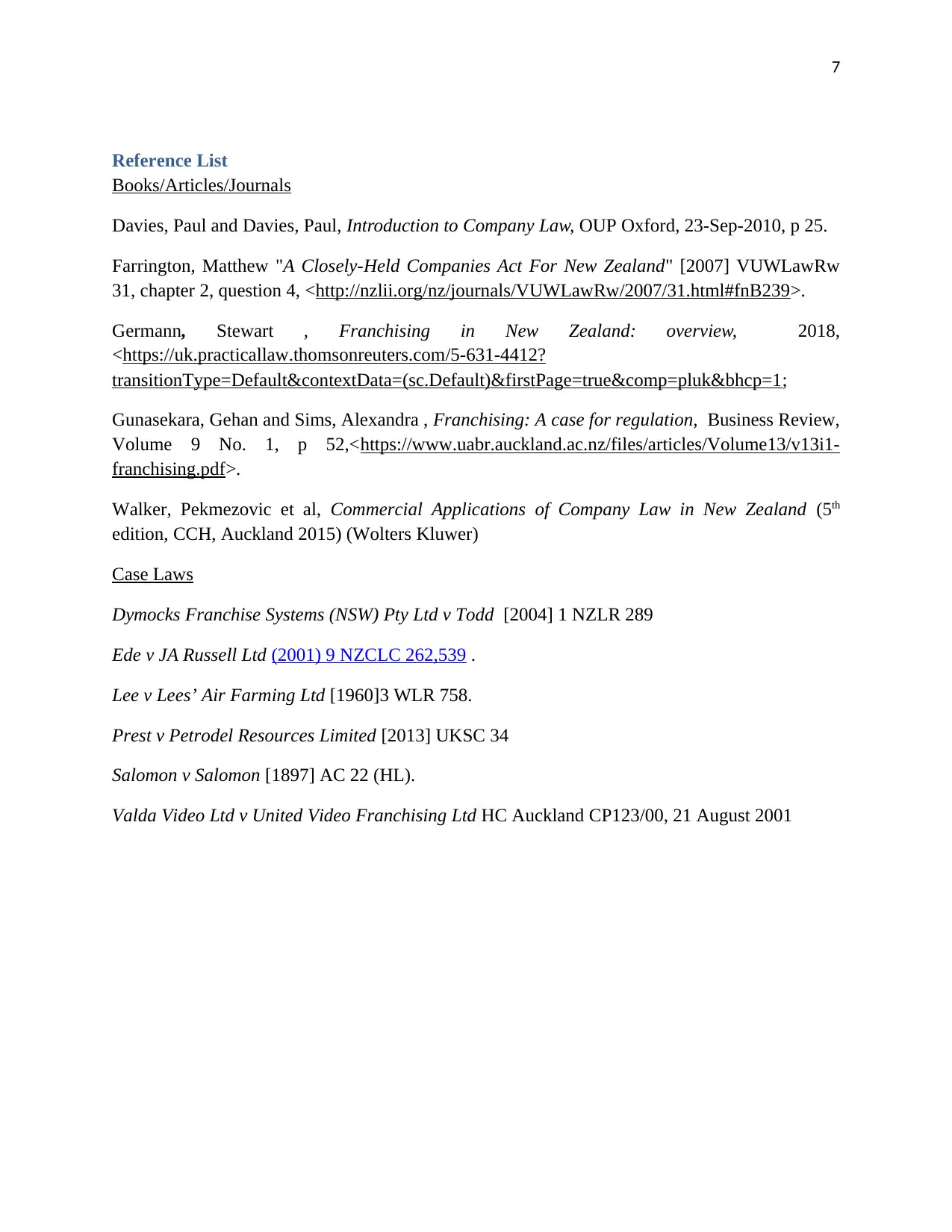
7
Reference List
Books/Articles/Journals
Davies, Paul and Davies, Paul, Introduction to Company Law, OUP Oxford, 23-Sep-2010, p 25.
Farrington, Matthew "A Closely-Held Companies Act For New Zealand" [2007] VUWLawRw
31, chapter 2, question 4, <http://nzlii.org/nz/journals/VUWLawRw/2007/31.html#fnB239>.
Germann, Stewart , Franchising in New Zealand: overview, 2018,
<https://uk.practicallaw.thomsonreuters.com/5-631-4412?
transitionType=Default&contextData=(sc.Default)&firstPage=true&comp=pluk&bhcp=1;
Gunasekara, Gehan and Sims, Alexandra , Franchising: A case for regulation, Business Review,
Volume 9 No. 1, p 52,<https://www.uabr.auckland.ac.nz/files/articles/Volume13/v13i1-
franchising.pdf>.
Walker, Pekmezovic et al, Commercial Applications of Company Law in New Zealand (5th
edition, CCH, Auckland 2015) (Wolters Kluwer)
Case Laws
Dymocks Franchise Systems (NSW) Pty Ltd v Todd [2004] 1 NZLR 289
Ede v JA Russell Ltd (2001) 9 NZCLC 262,539 .
Lee v Lees’ Air Farming Ltd [1960]3 WLR 758.
Prest v Petrodel Resources Limited [2013] UKSC 34
Salomon v Salomon [1897] AC 22 (HL).
Valda Video Ltd v United Video Franchising Ltd HC Auckland CP123/00, 21 August 2001
Reference List
Books/Articles/Journals
Davies, Paul and Davies, Paul, Introduction to Company Law, OUP Oxford, 23-Sep-2010, p 25.
Farrington, Matthew "A Closely-Held Companies Act For New Zealand" [2007] VUWLawRw
31, chapter 2, question 4, <http://nzlii.org/nz/journals/VUWLawRw/2007/31.html#fnB239>.
Germann, Stewart , Franchising in New Zealand: overview, 2018,
<https://uk.practicallaw.thomsonreuters.com/5-631-4412?
transitionType=Default&contextData=(sc.Default)&firstPage=true&comp=pluk&bhcp=1;
Gunasekara, Gehan and Sims, Alexandra , Franchising: A case for regulation, Business Review,
Volume 9 No. 1, p 52,<https://www.uabr.auckland.ac.nz/files/articles/Volume13/v13i1-
franchising.pdf>.
Walker, Pekmezovic et al, Commercial Applications of Company Law in New Zealand (5th
edition, CCH, Auckland 2015) (Wolters Kluwer)
Case Laws
Dymocks Franchise Systems (NSW) Pty Ltd v Todd [2004] 1 NZLR 289
Ede v JA Russell Ltd (2001) 9 NZCLC 262,539 .
Lee v Lees’ Air Farming Ltd [1960]3 WLR 758.
Prest v Petrodel Resources Limited [2013] UKSC 34
Salomon v Salomon [1897] AC 22 (HL).
Valda Video Ltd v United Video Franchising Ltd HC Auckland CP123/00, 21 August 2001
1 out of 7
Related Documents
Your All-in-One AI-Powered Toolkit for Academic Success.
+13062052269
info@desklib.com
Available 24*7 on WhatsApp / Email
![[object Object]](/_next/static/media/star-bottom.7253800d.svg)
Unlock your academic potential
Copyright © 2020–2025 A2Z Services. All Rights Reserved. Developed and managed by ZUCOL.



